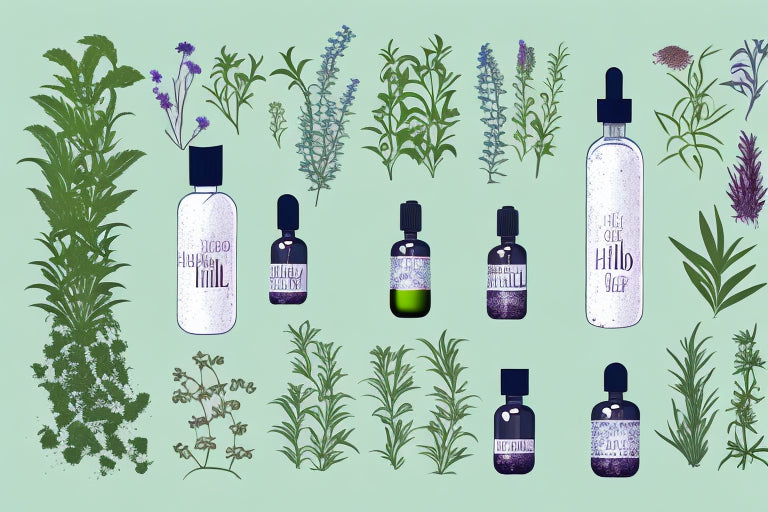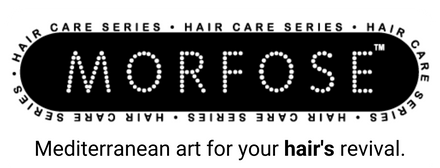The Benefits of Herbal Hair Oil: A Natural Way to Nourish Your Hair
Posted by MORFOSE COSMETICS

The Benefits of Herbal Hair Oil: A Natural Way to Nourish Your Hair
If you're searching for a natural way to nourish your hair and improve its overall condition, look no further than herbal hair oil. These oils are formulated with natural ingredients that can help to restore shine, reduce breakage, stimulate hair growth, and promote scalp health. Here's everything you need to know about herbal hair oils to give your locks the TLC it deserves.
Understanding Herbal Hair Oils
What are Herbal Hair Oils?
Herbal hair oils are a natural and effective way to promote healthy hair and scalp. These oils are formulated with a combination of carrier oils and essential oils that work together to provide nourishment and hydration to the hair and scalp. Unlike commercial hair products that contain harmful chemicals, herbal hair oils are made with natural ingredients that are gentle on your hair and scalp.
Herbal hair oils have been used for centuries in different cultures around the world. In India, for example, Ayurvedic practitioners have been using herbal hair oils to promote hair growth and prevent hair loss. These oils are believed to have therapeutic properties that can help to improve the overall health of your hair and scalp.
Common Ingredients in Herbal Hair Oils
Herbal hair oils typically contain a blend of carrier oils such as coconut oil, olive oil, sweet almond oil, or jojoba oil. These oils provide a nourishing base to the hair oil and help to lock in the moisture that keeps your hair looking shiny and healthy.
Essential oils, such as rosemary oil or lemongrass oil, are often added to provide additional benefits to the hair and scalp. Rosemary oil, for example, is known for its ability to stimulate hair growth and improve circulation in the scalp. Lemongrass oil is believed to have antimicrobial properties that can help to prevent scalp infections.
Other herbs like hibiscus, amla, or bhringraj are also used in herbal hair oils to add extra nutrition. Hibiscus, for example, is rich in vitamin C and amino acids that can help to strengthen hair roots and prevent hair fall. Amla, also known as Indian gooseberry, is a rich source of antioxidants that can help to protect hair from damage caused by free radicals. Bhringraj is a herb that is known for its ability to promote hair growth and prevent premature greying of hair.
How to Choose the Right Herbal Hair Oil for Your Hair Type
The choice of herbal hair oil depends on your hair type and scalp condition. Different types of hair oils are formulated to cater to specific hair types and problems.
For instance, if you have dry or damaged hair, coconut oil or argan oil-based formulas are ideal. Coconut oil is a great natural moisturizer that can help to nourish and repair dry and damaged hair. Argan oil is rich in vitamin E and fatty acids that can help to restore the natural shine and softness of your hair.
If you have an itchy or flaky scalp, tea tree oil or neem oil-based hair oils work best to soothe and heal the scalp. Tea tree oil has antifungal and antibacterial properties that can help to treat scalp infections and dandruff. Neem oil is a natural remedy for scalp psoriasis and eczema.
For thinning hair or hair loss, hair oils that contain rosemary or peppermint oil work well to improve circulation and stimulate hair growth. Rosemary oil has been shown to increase hair thickness and density, while peppermint oil can help to improve blood flow to the scalp and promote hair growth.
Before choosing a herbal hair oil, it's important to do a patch test to ensure that you're not allergic to any of the ingredients. Apply a small amount of the oil to your skin and wait for 24 hours to see if there's any reaction. If you experience any redness, itching, or swelling, discontinue use immediately.
In conclusion, herbal hair oils are a natural and safe way to promote healthy hair and scalp. By choosing the right type of hair oil for your hair type and scalp condition, you can enjoy the benefits of stronger, shinier, and more beautiful hair.
The Science Behind Herbal Hair Oils
Herbal hair oils have been used for centuries to promote healthy hair growth. They are made from natural ingredients that help to nourish and strengthen hair from the roots to the tips. In this article, we will explore the science behind herbal hair oils and how they work to promote hair growth.
How Herbal Hair Oils Promote Hair Growth
Herbal hair oils are formulated with ingredients that can help to stimulate hair growth and reduce hair loss. Carrier oils like castor oil contain ricinoleic acid known for its anti-inflammatory properties and helps improve blood circulation to the scalp, thus promoting hair growth. Essential oils such as rosemary oil are rich in antioxidants and improve scalp health by stimulating blood circulation and preventing hair damage.
When these oils are applied to the scalp, they penetrate the hair follicles and provide essential nutrients that promote healthy hair growth. They also help to strengthen the hair shaft, making it less prone to breakage and damage.
The Role of Essential Oils in Hair Health
Essential oils play an essential role in promoting healthy hair growth. These oils contain potent antifungal and antibacterial properties that can help to soothe and heal the scalp. Essential oils such as peppermint or eucalyptus oil help to unclog hair follicles and promote hair growth.
They also have a relaxing effect on the mind and body, which can help to reduce stress levels. Stress is a common cause of hair loss, so using essential oils in your hair care routine can help to promote overall hair health.
The Benefits of Carrier Oils in Herbal Hair Oils
Carrier oils contain essential fatty acids, vitamins, and minerals that help nourish hair and scalp. Coconut oil or jojoba oil contains essential nutrients that penetrate the hair shaft and increase strength and flexibility, while olive oil helps to tame frizz and add shine to the hair.
Using carrier oils in your hair care routine can help to moisturize and nourish your hair, leaving it soft, shiny, and healthy-looking. They also help to protect the hair from environmental damage, such as exposure to the sun and pollution.
In conclusion, herbal hair oils are a natural and effective way to promote healthy hair growth. They contain a variety of ingredients that work together to nourish and strengthen hair from the roots to the tips. By incorporating herbal hair oils into your hair care routine, you can achieve strong, healthy, and beautiful hair.
Top Benefits of Using Herbal Hair Oils
Herbal hair oils have been used for centuries to promote healthy hair growth and maintain luscious locks. In addition to their many benefits for hair health, they are also a natural and sustainable alternative to chemical-laden hair products. Here are some of the top benefits of using herbal hair oils:
Strengthening Hair and Preventing Breakage
Herbal hair oils are packed with essential nutrients that are beneficial for hair health. These nutrients help to strengthen hair from the roots, preventing breakage and split ends. They also create a protective layer over the hair strands, shielding them from environmental stressors such as pollution, sun exposure, and chemicals.
One of the most popular ingredients in herbal hair oils is coconut oil. Coconut oil is rich in lauric acid, which has been shown to penetrate the hair shaft and reduce protein loss. This makes hair stronger and less prone to breakage.
Reducing Dandruff and Scalp Irritation
A dry scalp can cause dandruff and scalp irritation, which can be uncomfortable and embarrassing. Herbal hair oils containing tea tree oil or neem oil can be effective in reducing the symptoms of dandruff and soothing the scalp.
Tea tree oil has powerful antifungal and antibacterial properties, which can help to eliminate the fungus that causes dandruff. Neem oil is also antifungal and antibacterial, and is known for its ability to soothe irritated skin.
Promoting Hair Growth and Thickness
Herbal hair oils containing essential oils such as rosemary, lavender, or peppermint can help to stimulate blood circulation in the scalp, which promotes hair growth and thickness. These oils work by increasing the delivery of oxygen and nutrients to hair follicles.
Rosemary oil has been shown to increase hair growth and thickness in people with androgenetic alopecia, a type of hair loss that affects both men and women. Lavender oil has been shown to promote hair growth in mice, and peppermint oil has been shown to increase the number of hair follicles and the depth of hair roots in human scalp tissue.
Restoring Shine and Softness
Herbal hair oils help to restore shine and softness by providing essential nutrients to the hair shaft, resulting in a smoother, softer appearance. They also help to smooth down the hair cuticle, reducing frizz and flyaways.
One of the most popular ingredients in herbal hair oils for restoring shine and softness is argan oil. Argan oil is rich in vitamin E and fatty acids, which help to moisturize and nourish the hair. It also contains antioxidants, which protect the hair from damage caused by free radicals.
Preventing Premature Graying
Premature graying can be a result of stress, environmental toxins, and nutrient deficiencies. Herbal hair oils containing vitamin E, amla, or bhringraj oil can help to nourish and protect the hair, preventing premature graying.
Amla oil is a popular ingredient in herbal hair oils for preventing premature graying. Amla, also known as Indian gooseberry, is rich in antioxidants and vitamin C, which help to protect the hair from damage caused by free radicals. Bhringraj oil is also beneficial for preventing premature graying, as it is rich in antioxidants and has been shown to stimulate melanin production in hair follicles.
In conclusion, using herbal hair oils is a great way to promote healthy hair growth, maintain luscious locks, and avoid the harsh chemicals found in many commercial hair products. By incorporating herbal hair oils into your hair care routine, you can enjoy the many benefits of these natural and sustainable ingredients.
How to Use Herbal Hair Oils for Maximum Benefits
Preparing Your Hair for Oil Application
Before using herbal hair oils, it's crucial to prepare your hair by detangling it with a comb and washing it thoroughly to remove any build-up of dirt or product. This helps the oil to penetrate the hair strands more effectively.
Applying Herbal Hair Oil: Techniques and Tips
When applying hair oil, it's important to massage it gently into the hair and scalp to increase absorption. It's best to apply hair oil when your hair is damp. Use your fingers or a brush to distribute the oil evenly throughout your hair, paying extra attention to the ends.
How Often Should You Use Herbal Hair Oils?
The frequency of using hair oils depends on your hair type and scalp condition. Dry hair or hair that needs extra nourishment can benefit from frequent use of hair oil, while oily hair may require only occasional use. For best results, use herbal hair oil at least once a week.
Conclusion
Herbal hair oils are an excellent natural way to nourish your hair and promote healthy hair growth. With a variety of carrier oils and essential oils, you can choose the right hair oil that suits your hair type and scalp condition. Use hair oil at least once a week to enjoy its multitude of benefits, including shiny, soft, and healthy-looking hair.


